牛津译林版英语七年级上册Unit 3 Welcome to our school单元复习课件(共29张PPT)
文档属性
| 名称 | 牛津译林版英语七年级上册Unit 3 Welcome to our school单元复习课件(共29张PPT) | 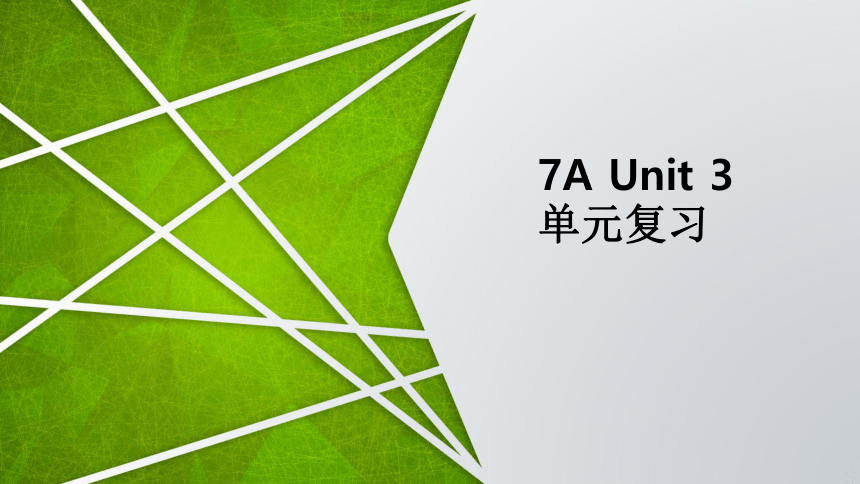 | |
| 格式 | zip | ||
| 文件大小 | 9.3MB | ||
| 资源类型 | 教案 | ||
| 版本资源 | 牛津译林版 | ||
| 科目 | 英语 | ||
| 更新时间 | 2021-10-17 12:24:38 | ||
图片预览

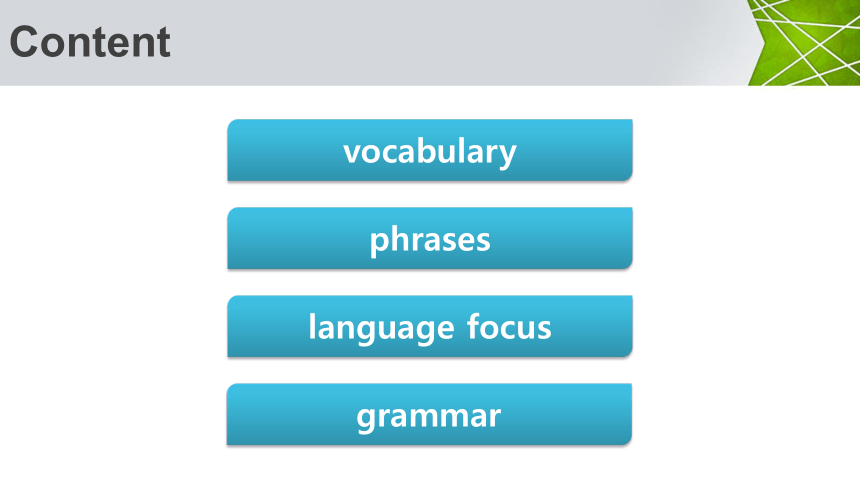
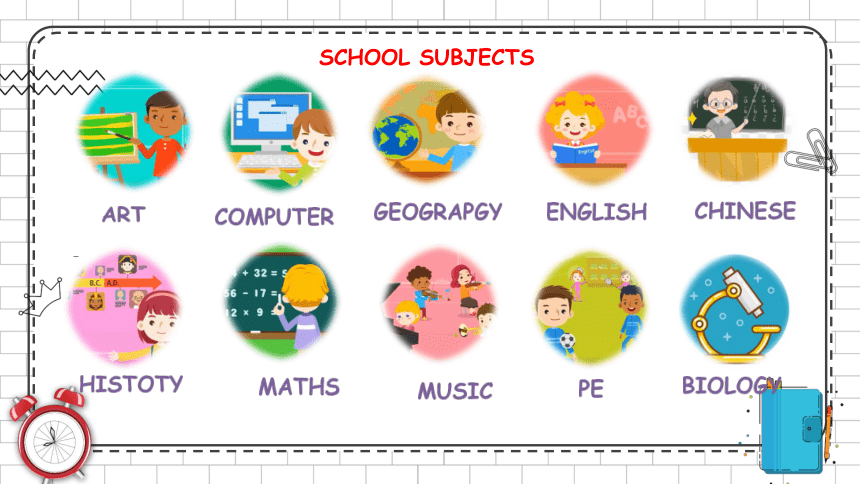
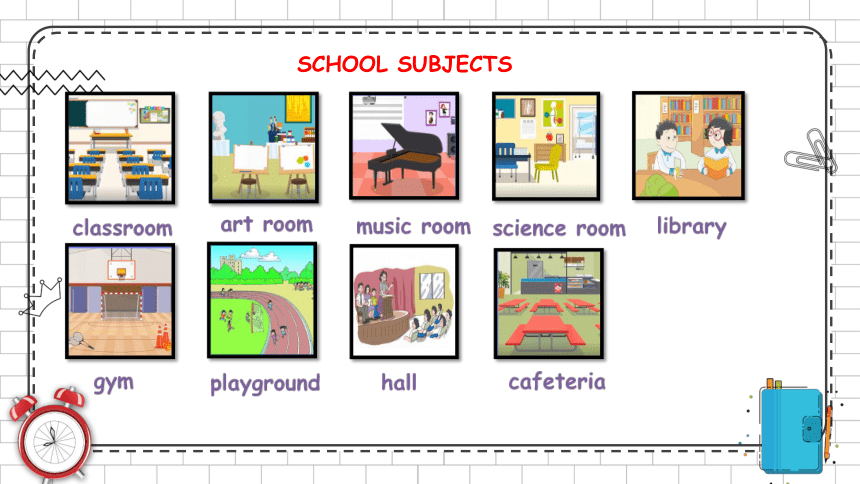
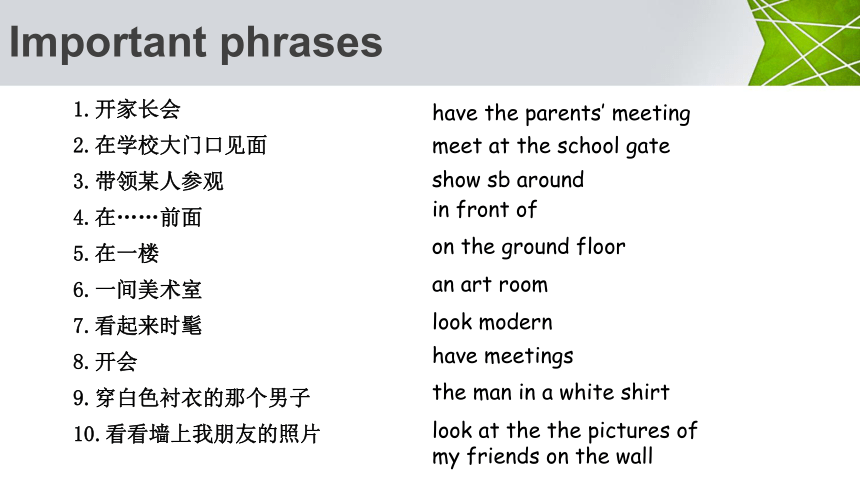
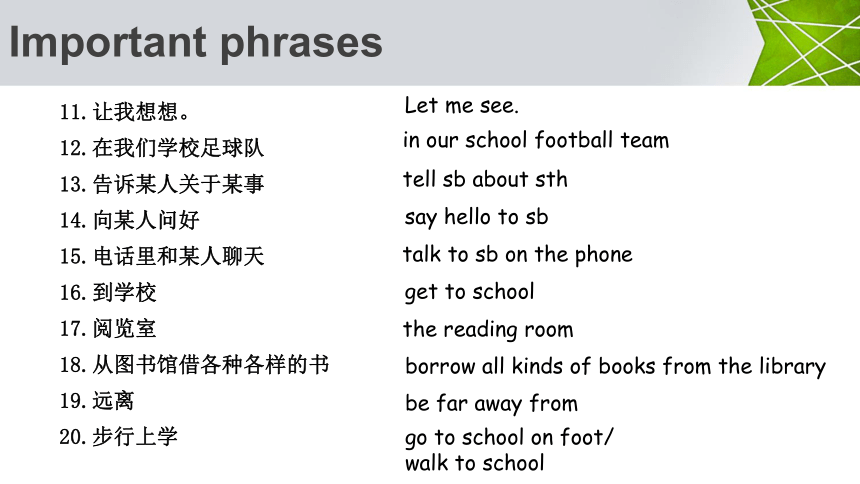
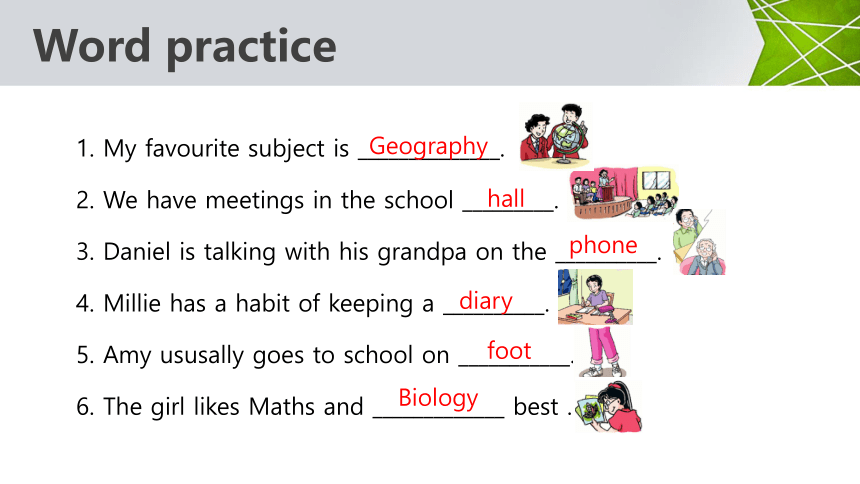
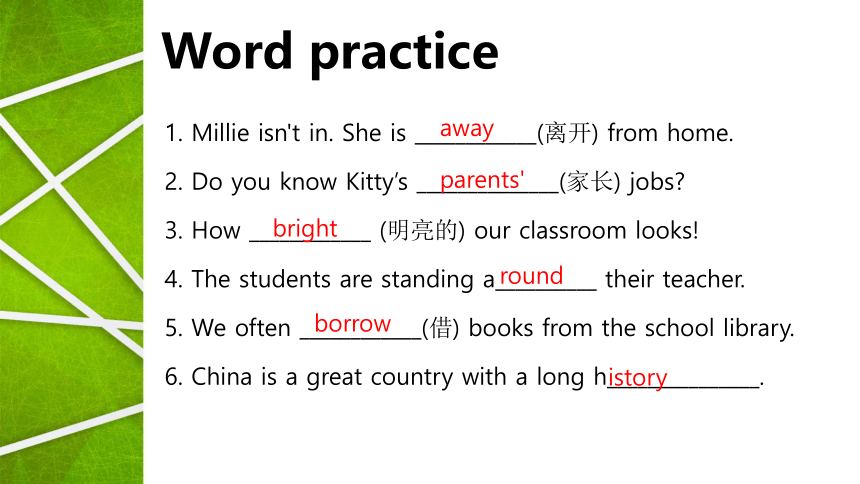
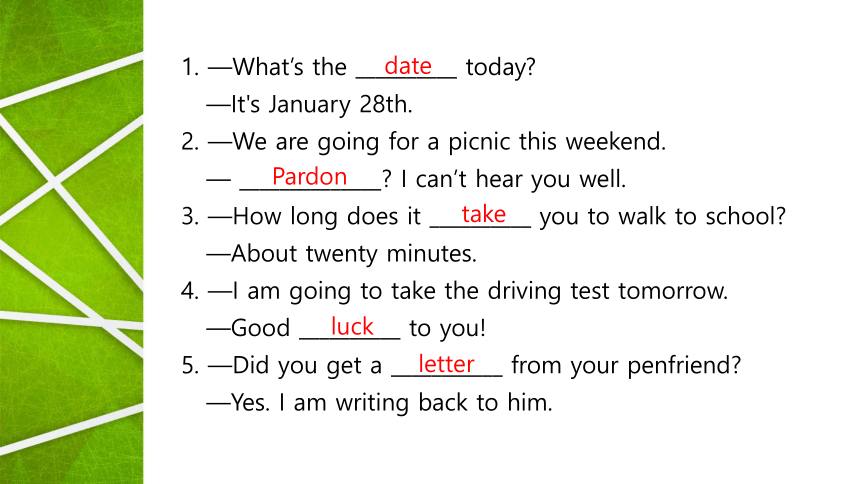
文档简介
(共29张PPT)
7A Unit 3
单元复习
Content
vocabulary
phrases
language focus
grammar
ART
COMPUTER
GEOGRAPGY
ENGLISH
BIOLOGY
HISTOTY
MATHS
MUSIC
PE
CHINESE
SCHOOL SUBJECTS
gym
classroom
music room
science room
cafeteria
art room
hall
library
playground
SCHOOL SUBJECTS
Important phrases
1.开家长会
2.在学校大门口见面
3.带领某人参观
4.在……前面
5.在一楼
6.一间美术室
7.看起来时髦
8.开会
9.穿白色衬衣的那个男子
10.看看墙上我朋友的照片
show sb around
on the ground floor
meet at the school gate
look modern
have the parents’ meeting
in front of
an art room
have meetings
the man in a white shirt
look at the the pictures of my friends on the wall
Important phrases
11.让我想想。
12.在我们学校足球队
13.告诉某人关于某事
14.向某人问好
15.电话里和某人聊天
16.到学校
17.阅览室
18.从图书馆借各种各样的书
19.远离
20.步行上学
tell sb about sth
talk to sb on the phone
in our school football team
the reading room
Let me see.
say hello to sb
get to school
borrow all kinds of books from the library
be far away from
go to school on foot/
walk to school
1. My favourite subject is ______________.
2. We have meetings in the school _________.
3. Daniel is talking with his grandpa on the __________.
4. Millie has a habit of keeping a __________.
5. Amy ususally goes to school on ___________.
6. The girl likes Maths and _____________ best .
Word practice
Geography
hall
phone
diary
foot
Biology
1. Millie isn't in. She is ____________(离开) from home.
2. Do you know Kitty’s ______________(家长) jobs
3. How ____________ (明亮的) our classroom looks!
4. The students are standing a__________ their teacher.
5. We often ____________(借) books from the school library.
6. China is a great country with a long h_______________.
away
parents'
bright
borrow
Word practice
round
istory
1. —What’s the __________ today
—It's January 28th.
2. —We are going for a picnic this weekend.
— ______________ I can’t hear you well.
3. —How long does it __________ you to walk to school
—About twenty minutes.
4. —I am going to take the driving test tomorrow.
—Good __________ to you!
5. —Did you get a ___________ from your penfriend
—Yes. I am writing back to him.
date
Pardon
take
luck
letter
The red car is my mother's.(对划线部分提问)
__________________________
Language focus
Which of the subjects do you like best,Eddie (P30)埃迪,你最喜欢什么学科
本句中which意为“哪个(些)”,常对同类事物中某一个(些)提问。
此句还可以改为:What's _________________________ 如:
Which is your favourite room 哪一个是你最喜欢的房间
Which book do you want to buy 你想要买哪本书
Which car is your mother's
your favourite subject
I have two cakes, and you have one, so I can eat three!(P30)我有两个蛋糕,你有一个,所以我可以吃三个!
本句中so为连词,意为“因此,所以”,连接状语从句;引导的从句通常放在主句之后。如:
Amy likes English,so she often reads it in the morning.
埃米喜欢英语,所以她经常在早晨读英语。
【注意】汉语中通常用“因为……所以……”来表示因果关系,但在英语中,通常用了because就不能再用so;用了so,就不能再用
because。
She gets up late,so she is late for school every day.
=She is late for school every day ________________________________.
because she gets up late
1) 让这个男孩带我们参观你们学校吧!
Let ______________________________.
2) 请向我出示一下你的身份证(ID card)。
______________________________________________________________________.
Let me show you around!(32)让我带你四处看看吧!
show作动词,意思是“引;带;领”,常构成短语show sb. around(带领某人参观)。另外,show还有“给某人看;显示”的意思,短语show sb. sth. /show sth. to sb.表示“把某物给某人看”。如:
Can you show it to me 你能把它给我看看吗
the boy show us around your school
Please show your ID card to me. / Please show me your ID card.
Who's the man in a white shirt (P32)那个穿白衬衫的男子是谁?
in是介词,意思是“穿着,戴着”,in a white shirt做后置定语,修饰
the man。如:
The man in a blue shirt is my father.
那个穿着蓝色T恤衫的男子是我爸爸。
You look lovely in your new hat. 你戴上这顶新帽子很可爱。
辨析:The girl with short hair is Millie. 那个短发女孩是米莉。
The woman with glasses is Millie's mother.
那个戴眼镜的女士是米莉的妈妈。
with
in
1. The girl _________ a ponytail is Millie's cousin.
2. How nice she looks _______ red!
Your school looks beautiful. (P32)
1) The baby looks so _______ that everyone loves him very much.
A. cute B. hard C. well D. kind
2) Our new English teacher looks _______.
A. carefully B. friendly C. nicely D. beautifully
①感官动词look
意为“看起来、看上去”,后接形容词。
②实意动词look
意为“看”,用副词修饰。look at+宾语
Eg: Please look at the blackboard carefully.
③ 与look 有关短语:look after, look for, look up, look over
他每周花两个小时练习网球。
It __________________________________every week.
It takes me about half an hour.(P38)我大约花半个小时。
It takes(sb.) some time to do sth. 意思是“花费(某/v)……时间做某事”。其中it是形式主语,真正的主语是to do sth.。如:
It takes her twenty minutes to walk home every day.
她每天花二十分钟走回家。
【注意】本句型也能替换成:sb. spend(s) sometime doing sth.,因此上一句可转换成:
She spends twenty minutes walking home every day.
takes him two hours to practise tennis
How long does it take him to practise tennis every week
Thanks for your letter. 感谢你的信。(P40)
Thanks for…意为“感谢……”
用法:Thanks /Thank sb for +n./doing 感谢某人(做)某事
1. 感谢你的帮助。
2. 谢谢你告诉我这个消息。
3. —Thank you _______ me clean the room, Helen.
—You are welcome.
A. to help B. to helping
C. for helping D. for help
Thanks for your help. / Thank you for helping me.
Thank you for telling me the news.
When is it open (P38) 它(图书馆)什么时候开放?
句中的open是形容词,意思是“开放的,敞开的”。open也可用作形容词,意思是“打开,开启”。如:
The library is open from 8 a.m. to 5:50 p.m.
图书馆从上午8点到下午5:30开放。
Open the door for me, please. 请为我开一下门。
open (v.) 反义词:close(v.) 关,闭
open (adj.) 反义词:closed(adj.)
Open
open
closed
1. —_________ the door for dad, Tom.
—But the door is __________.
2. We can't visit the museum today because it's ______ today.
borrow与lend的用法
两者都可表示“借”,但是 borrow 指“借入”,而 lend 则指“借出”。表示“向某人借某物”用borrow sth.from sb.要表示“把某物借给某人”,英语用lend sth to sb。如:
Tom often borrows some money from his friends. 汤姆经常向他的朋友们借一些钱。Can you lend me 5 yuan I'll pay you back tomorrow. 可以借我5元吗 我明天还你。
【拓展】keep“保存”,用来表示借一段时间。如:
How long can I keep the book 这本书我可以借多久?
borrow
keep
lend
—May I _________ your dictionary(字典)
—Yes, you can ______ for two days. But you can't ______
it to others.
hope与wish的区别
I hope to see you soon. 希望很快见到你。
I wish I could fly like a bird. 我希望像鸟儿一样飞。
I hope him to win. (×)
I hope he will win. (√)
词性 hope wish
名词 希望,期待 愿望,心愿
动词 hope to do sth wish to do sth
hope + (that) +从句 wish + (that) +从句
wish sb to do sth
wish sb +名词短语
用hope或wish的正确形式填空。
1) We ___________ our basketball team will win the match.
2) My father ___________ me to be an artist when I grow up.
3) He __________________ to watch the new film next Sunday.
4) I ___________ I could fly like a bird some day.
5) __________ all your family a happy New Year!
hope
wishes
hopes
/ wishes
wish
Wish
1. There is only _________ milk in the fridge. Let's go and
buy some more.
2. He has ________ friends in the new school, does he
few、a few、little与a little的区别
项目 后接名词 含义
few 可数名词(否定词) 很少,不多
little 不可数名词(否定词) 少许,几乎没有
a few 可数名词(肯定词) 几个,一些
a little 不可数名词(肯定词) 少量,一点
a little
few
Practice
1. Her sister goes to the Music Club _______ every Monday morning.
A. 不填 B. at C. on D. in
2. _________ are good at playing volleyball.
A. The twins all B. Both of twins
C. The twins both D. Both of the twins
3. —There are so many friends at your birthday party.
—Yes, and I hope Mr. Li __________.
A. coming B. to come C. comes D. will come
4. The shop near our school _________ at eight a.m. and it _________ for
twelve hours a day.
A. is open; opens B. opens; is open
C. is opening; is open D. opens; is opening
5. — ________ of you can jump over the wall —David can.
A. Who B. Whose C. Which D. What
6. There are many oranges here. You can take ________ if you
like.
A. few B. a few C. little D. a little
7. —_________ is it from here to the station
— About 15 minutes’ walk.
A. How far B. How long
C. How often D. How many
8. — Don’t stand _________ me. I can’t see the blackboard.
— I’m sorry.
A. next B. behind
C. in the front of D. in front of
Grammar
Millie is showing her mother around her school.
They are in front of the classroom building.
There are 18 classrooms in it.
There is a library too. It is very big. She often borrow books from it.
personal
pronouns
subject form
object form
单数 复数 主格 宾格 主格 宾格
第一人称 I me we us
第二人称 you you you you
第三人称 he him they them
she her it it Personal pronouns (人称代词)
人称代词的用法
1. 人称代词作主语,用在句首,位于谓语动词之前。
I am thirteen years old.
2. 人称代词作宾语,用在动词或者介词之后。
My parents love me very much.
3. 作表语时多用在正式文体中用主格,在口语中用宾格。
—Who is it
—It’s me. (口语中)/It is I.(正式文体中)
人称代词的词序
1. 单数人称中通常把I 放在最后。在英语中为了显示对他人的尊敬,通常把别人放在前面。 一般顺序为:you, he/she/it, I, 但单数人称代词的顺序表示承认错误或者承担责任时,I放在首位。如:
I and you are late for class.
2. 在英语中复数人称代词的顺序是:we, you, they.
3. 两个第三人称同时出现时,一般遵循先男后女的原则,即把男性人称代词放在前面,如:
He and she are classmates.
1.(2020 淮安)My English teacher has a good sense of humour. We all like ____.
A. she B. her C. hers D. herself
2.(2020 黔南)Though the man is not handsome, _______ is very kind.
A. its B. it C. he D. she
3.(2020 天津)I bought a present for ________. I hope you like _________.
A. you; this B. yours; that C. you; it D. you; one
4.(2020 邵阳)—Do you like English
—Yes, but I think _____ is a great challenge to learn the language well.
A. that B. this C. it D. its
5.(2019 苏州) —Hello, are you Mr Morrison
—Yes. That’s ______.
A. him B. me C. you D. us
6. —Jerry, is that boy with glasses _______ new classmates
—Yes. Let’s say hello to ________.
A. our; he B. us; him C. ours; his D. our; him
1. 我最喜爱的学科是语文和英语。
2. 我喜爱阅读因为我能从书中学到很多。
3. 我经常和朋友们谈论有趣的书籍。
4. 我们总是有太多的回家作业。
5. 有时我没有很多时间看书。
6. 我希望能阅读更多的好书。
My favourite subjects are Chinese and English.
I like reading because I can learn a lot from books.
I often talk about interesting books with my friends.
We always have too much homework.
Sometimes I don't have much time to read books.
I hope to read more good books.
Thanks for your attention.
7A Unit 3
单元复习
Content
vocabulary
phrases
language focus
grammar
ART
COMPUTER
GEOGRAPGY
ENGLISH
BIOLOGY
HISTOTY
MATHS
MUSIC
PE
CHINESE
SCHOOL SUBJECTS
gym
classroom
music room
science room
cafeteria
art room
hall
library
playground
SCHOOL SUBJECTS
Important phrases
1.开家长会
2.在学校大门口见面
3.带领某人参观
4.在……前面
5.在一楼
6.一间美术室
7.看起来时髦
8.开会
9.穿白色衬衣的那个男子
10.看看墙上我朋友的照片
show sb around
on the ground floor
meet at the school gate
look modern
have the parents’ meeting
in front of
an art room
have meetings
the man in a white shirt
look at the the pictures of my friends on the wall
Important phrases
11.让我想想。
12.在我们学校足球队
13.告诉某人关于某事
14.向某人问好
15.电话里和某人聊天
16.到学校
17.阅览室
18.从图书馆借各种各样的书
19.远离
20.步行上学
tell sb about sth
talk to sb on the phone
in our school football team
the reading room
Let me see.
say hello to sb
get to school
borrow all kinds of books from the library
be far away from
go to school on foot/
walk to school
1. My favourite subject is ______________.
2. We have meetings in the school _________.
3. Daniel is talking with his grandpa on the __________.
4. Millie has a habit of keeping a __________.
5. Amy ususally goes to school on ___________.
6. The girl likes Maths and _____________ best .
Word practice
Geography
hall
phone
diary
foot
Biology
1. Millie isn't in. She is ____________(离开) from home.
2. Do you know Kitty’s ______________(家长) jobs
3. How ____________ (明亮的) our classroom looks!
4. The students are standing a__________ their teacher.
5. We often ____________(借) books from the school library.
6. China is a great country with a long h_______________.
away
parents'
bright
borrow
Word practice
round
istory
1. —What’s the __________ today
—It's January 28th.
2. —We are going for a picnic this weekend.
— ______________ I can’t hear you well.
3. —How long does it __________ you to walk to school
—About twenty minutes.
4. —I am going to take the driving test tomorrow.
—Good __________ to you!
5. —Did you get a ___________ from your penfriend
—Yes. I am writing back to him.
date
Pardon
take
luck
letter
The red car is my mother's.(对划线部分提问)
__________________________
Language focus
Which of the subjects do you like best,Eddie (P30)埃迪,你最喜欢什么学科
本句中which意为“哪个(些)”,常对同类事物中某一个(些)提问。
此句还可以改为:What's _________________________ 如:
Which is your favourite room 哪一个是你最喜欢的房间
Which book do you want to buy 你想要买哪本书
Which car is your mother's
your favourite subject
I have two cakes, and you have one, so I can eat three!(P30)我有两个蛋糕,你有一个,所以我可以吃三个!
本句中so为连词,意为“因此,所以”,连接状语从句;引导的从句通常放在主句之后。如:
Amy likes English,so she often reads it in the morning.
埃米喜欢英语,所以她经常在早晨读英语。
【注意】汉语中通常用“因为……所以……”来表示因果关系,但在英语中,通常用了because就不能再用so;用了so,就不能再用
because。
She gets up late,so she is late for school every day.
=She is late for school every day ________________________________.
because she gets up late
1) 让这个男孩带我们参观你们学校吧!
Let ______________________________.
2) 请向我出示一下你的身份证(ID card)。
______________________________________________________________________.
Let me show you around!(32)让我带你四处看看吧!
show作动词,意思是“引;带;领”,常构成短语show sb. around(带领某人参观)。另外,show还有“给某人看;显示”的意思,短语show sb. sth. /show sth. to sb.表示“把某物给某人看”。如:
Can you show it to me 你能把它给我看看吗
the boy show us around your school
Please show your ID card to me. / Please show me your ID card.
Who's the man in a white shirt (P32)那个穿白衬衫的男子是谁?
in是介词,意思是“穿着,戴着”,in a white shirt做后置定语,修饰
the man。如:
The man in a blue shirt is my father.
那个穿着蓝色T恤衫的男子是我爸爸。
You look lovely in your new hat. 你戴上这顶新帽子很可爱。
辨析:The girl with short hair is Millie. 那个短发女孩是米莉。
The woman with glasses is Millie's mother.
那个戴眼镜的女士是米莉的妈妈。
with
in
1. The girl _________ a ponytail is Millie's cousin.
2. How nice she looks _______ red!
Your school looks beautiful. (P32)
1) The baby looks so _______ that everyone loves him very much.
A. cute B. hard C. well D. kind
2) Our new English teacher looks _______.
A. carefully B. friendly C. nicely D. beautifully
①感官动词look
意为“看起来、看上去”,后接形容词。
②实意动词look
意为“看”,用副词修饰。look at+宾语
Eg: Please look at the blackboard carefully.
③ 与look 有关短语:look after, look for, look up, look over
他每周花两个小时练习网球。
It __________________________________every week.
It takes me about half an hour.(P38)我大约花半个小时。
It takes(sb.) some time to do sth. 意思是“花费(某/v)……时间做某事”。其中it是形式主语,真正的主语是to do sth.。如:
It takes her twenty minutes to walk home every day.
她每天花二十分钟走回家。
【注意】本句型也能替换成:sb. spend(s) sometime doing sth.,因此上一句可转换成:
She spends twenty minutes walking home every day.
takes him two hours to practise tennis
How long does it take him to practise tennis every week
Thanks for your letter. 感谢你的信。(P40)
Thanks for…意为“感谢……”
用法:Thanks /Thank sb for +n./doing 感谢某人(做)某事
1. 感谢你的帮助。
2. 谢谢你告诉我这个消息。
3. —Thank you _______ me clean the room, Helen.
—You are welcome.
A. to help B. to helping
C. for helping D. for help
Thanks for your help. / Thank you for helping me.
Thank you for telling me the news.
When is it open (P38) 它(图书馆)什么时候开放?
句中的open是形容词,意思是“开放的,敞开的”。open也可用作形容词,意思是“打开,开启”。如:
The library is open from 8 a.m. to 5:50 p.m.
图书馆从上午8点到下午5:30开放。
Open the door for me, please. 请为我开一下门。
open (v.) 反义词:close(v.) 关,闭
open (adj.) 反义词:closed(adj.)
Open
open
closed
1. —_________ the door for dad, Tom.
—But the door is __________.
2. We can't visit the museum today because it's ______ today.
borrow与lend的用法
两者都可表示“借”,但是 borrow 指“借入”,而 lend 则指“借出”。表示“向某人借某物”用borrow sth.from sb.要表示“把某物借给某人”,英语用lend sth to sb。如:
Tom often borrows some money from his friends. 汤姆经常向他的朋友们借一些钱。Can you lend me 5 yuan I'll pay you back tomorrow. 可以借我5元吗 我明天还你。
【拓展】keep“保存”,用来表示借一段时间。如:
How long can I keep the book 这本书我可以借多久?
borrow
keep
lend
—May I _________ your dictionary(字典)
—Yes, you can ______ for two days. But you can't ______
it to others.
hope与wish的区别
I hope to see you soon. 希望很快见到你。
I wish I could fly like a bird. 我希望像鸟儿一样飞。
I hope him to win. (×)
I hope he will win. (√)
词性 hope wish
名词 希望,期待 愿望,心愿
动词 hope to do sth wish to do sth
hope + (that) +从句 wish + (that) +从句
wish sb to do sth
wish sb +名词短语
用hope或wish的正确形式填空。
1) We ___________ our basketball team will win the match.
2) My father ___________ me to be an artist when I grow up.
3) He __________________ to watch the new film next Sunday.
4) I ___________ I could fly like a bird some day.
5) __________ all your family a happy New Year!
hope
wishes
hopes
/ wishes
wish
Wish
1. There is only _________ milk in the fridge. Let's go and
buy some more.
2. He has ________ friends in the new school, does he
few、a few、little与a little的区别
项目 后接名词 含义
few 可数名词(否定词) 很少,不多
little 不可数名词(否定词) 少许,几乎没有
a few 可数名词(肯定词) 几个,一些
a little 不可数名词(肯定词) 少量,一点
a little
few
Practice
1. Her sister goes to the Music Club _______ every Monday morning.
A. 不填 B. at C. on D. in
2. _________ are good at playing volleyball.
A. The twins all B. Both of twins
C. The twins both D. Both of the twins
3. —There are so many friends at your birthday party.
—Yes, and I hope Mr. Li __________.
A. coming B. to come C. comes D. will come
4. The shop near our school _________ at eight a.m. and it _________ for
twelve hours a day.
A. is open; opens B. opens; is open
C. is opening; is open D. opens; is opening
5. — ________ of you can jump over the wall —David can.
A. Who B. Whose C. Which D. What
6. There are many oranges here. You can take ________ if you
like.
A. few B. a few C. little D. a little
7. —_________ is it from here to the station
— About 15 minutes’ walk.
A. How far B. How long
C. How often D. How many
8. — Don’t stand _________ me. I can’t see the blackboard.
— I’m sorry.
A. next B. behind
C. in the front of D. in front of
Grammar
Millie is showing her mother around her school.
They are in front of the classroom building.
There are 18 classrooms in it.
There is a library too. It is very big. She often borrow books from it.
personal
pronouns
subject form
object form
单数 复数 主格 宾格 主格 宾格
第一人称 I me we us
第二人称 you you you you
第三人称 he him they them
she her it it Personal pronouns (人称代词)
人称代词的用法
1. 人称代词作主语,用在句首,位于谓语动词之前。
I am thirteen years old.
2. 人称代词作宾语,用在动词或者介词之后。
My parents love me very much.
3. 作表语时多用在正式文体中用主格,在口语中用宾格。
—Who is it
—It’s me. (口语中)/It is I.(正式文体中)
人称代词的词序
1. 单数人称中通常把I 放在最后。在英语中为了显示对他人的尊敬,通常把别人放在前面。 一般顺序为:you, he/she/it, I, 但单数人称代词的顺序表示承认错误或者承担责任时,I放在首位。如:
I and you are late for class.
2. 在英语中复数人称代词的顺序是:we, you, they.
3. 两个第三人称同时出现时,一般遵循先男后女的原则,即把男性人称代词放在前面,如:
He and she are classmates.
1.(2020 淮安)My English teacher has a good sense of humour. We all like ____.
A. she B. her C. hers D. herself
2.(2020 黔南)Though the man is not handsome, _______ is very kind.
A. its B. it C. he D. she
3.(2020 天津)I bought a present for ________. I hope you like _________.
A. you; this B. yours; that C. you; it D. you; one
4.(2020 邵阳)—Do you like English
—Yes, but I think _____ is a great challenge to learn the language well.
A. that B. this C. it D. its
5.(2019 苏州) —Hello, are you Mr Morrison
—Yes. That’s ______.
A. him B. me C. you D. us
6. —Jerry, is that boy with glasses _______ new classmates
—Yes. Let’s say hello to ________.
A. our; he B. us; him C. ours; his D. our; him
1. 我最喜爱的学科是语文和英语。
2. 我喜爱阅读因为我能从书中学到很多。
3. 我经常和朋友们谈论有趣的书籍。
4. 我们总是有太多的回家作业。
5. 有时我没有很多时间看书。
6. 我希望能阅读更多的好书。
My favourite subjects are Chinese and English.
I like reading because I can learn a lot from books.
I often talk about interesting books with my friends.
We always have too much homework.
Sometimes I don't have much time to read books.
I hope to read more good books.
Thanks for your attention.
同课章节目录
- 预备课程
- Lesson 1 Nice to meet you !
- Lesson 2 A happy family
- Lesson 3 A nice school
- Lesson 4 You look cool !
- Lesson 5 Wonderful things
- Lesson 6 Have nice food
- Lesson 7 Enjoy our days
- Lesson 8 Let's have fun !
- Unit 1 This is me
- Unit 2 Let's play sports
- Unit 3 Welcome to our school
- Unit 4 My day
- Unit 5 Let’s celebrate
- Unit 6 Food and lifestyle
- Unit 7 Shopping
- Unit 8 Fashion
